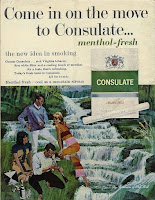 |
| Three views of the yellow shed – I don't have a complete photograph. |
“Every man should have a shed” the saying goes. Well, I got a shed at the age of twelve when I took over the yellow one in the garden. Did that make me a man?
There I drank my first bottle of John Smith’s Magnet Pale Ale, brazenly bought from the corner shop with my own pocket money in the confidence they would assume I was on a parent’s errand. And there I tried one of my mother’s menthol flavoured Consulate cigarettes and well and truly wished I hadn’t.
Whether these experiments in manliness were as masculine as they seemed at the time I’m not sure. Magnet Pale Ale might have been copiously consumed by Tristan Farnon in the James Herriot books, but it was promoted by the image of a comely young woman with smooth bare legs and shoulders, long ear rings dangling evocatively below blonde Marilyn Monroe curls as she alluringly raises her stemmed glass to declare it “a magnet for me!” Consulate cigarettes, “cool as a mountain stream”, also employed a preponderance of girly social situations, not at all like the manly virility of the Player’s Navy Cut sailor or the Marlboro cowboy, or the self-assured independence of the raincoated, Sinatra-like, “never-alone” Strand character.*
The yellow shed became my own private space. It was my dark-room, games room, chemistry laboratory and music studio. I imagined myself carrying out investigations into original problems, creating new knowledge, an academic in the making. Apart from a few gardening tools, yard brushes and a stepladder, most of the clutter had moved to our new asbestos garage.
Among my old, self-developed 127-sized negatives were two photographs of the inside. Oh what memories!
Pinned to the wall is a map of the East Riding from Flamborough to Spurn, Bridlington to Barnsley, and photographs of singers and pop groups. The large one is The Animals, and although the others are too small to make out, I think The Hollies and The Searchers are among them. Beneath them, on the ledge above the white ‘meat safe’ cupboard, my half-sized cricket bat lies next to a wooden block drilled with holes to hold pens and pencils.
You can see my ‘new’ bicycle with its straight handlebars, white mudguards and three speed Sturmey Archer gears, and the Philips EL 3541 reel-to-reel tape recorder used to record pop-music from the radio, and to boost my homework grades by recording the series of science programmes we listened to at school.
Chalked around the half-sized dartboard are the words “TRY TO HIT THE BOARD NOT THE WALL”. Impressively, there seem to be no tell-tale dart holes in the woodwork, even on my high resolution image. However, I hope I moved the tape recorder and bare-bulbed table lamp out of harm’s way before throwing any darts. I especially hope I remembered to protect the bottle in the corner just behind the watering can, because this is the hexagonal emerald-green bottle of hydrochloric acid, still three quarters full, mentioned in a previous post.
One can only be appalled by the electrical wiring. It’s a wonder I didn’t electrocute myself or burn the place down. The power supply enters the shed through a hole in the wall above the stepladder – you can just make it out running along the wall outside from the house, above the coal house door in the first picture. At the same end of the shed, a very old fashioned electric fire stands on a couple of wooden blocks nailed to the ledge, its mains cable hanging by a hook. The supply to the tape recorder and table lamp at the other end runs along the roof. There seem to be rather a lot of joins wound round with insulating tape, or perhaps, horrifyingly, sellotape. However, the twisted pair cable along the rear wall, running through a home-made switch box, is merely the lead to the extension loudspeaker fixed above the electric fire – the very same speaker on which my dad listened to Hancock’s Half Hour in the front room in the nineteen fifties.
One warm summer afternoon, the shed door wide open and the extension speaker full on, I switched on the tape recorder, plugged in the microphone, and began to broadcast my own music programme complete with jokes and witty repartee. The Animals, Searchers and Hollies could clearly be heard a dozen or so houses in all directions, up and down the street, across the road, and at the back. Between records came the jokes. “Did you hear about the constipated mathematician?” I was heard to ask, and before my mother could come running out of the house to put a stop to it I provided the answer. “He worked it out with a pencil.” Outrageous in the polite company of the early nineteen-sixties.
* One could write a whole piece about cigarette advertising. One amusing fact is that Marlboro cigarettes were originally marketed for women with slogans such as “Red beauty tips to match your lips and fingertips”, but Philip Morris gave the brand a sex change in 1954 when they began to advertise it as a filter cigarette for men, and introduced the ‘Marlboro Man’ who exuded masculine virility.






